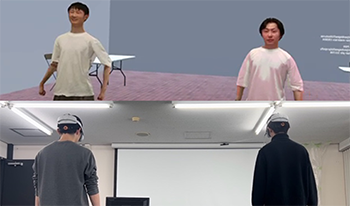
This study aims to investigate how swapping realistic avatars between users in shared VR spaces affects self-body ownership and changes perceptions of others. In the experiment, two participants shared the same VR space. Two conditions were presented in random order: one where participants used their own realistic avatar (matched condition) and one where participants swapped avatars and used the other's realistic avatar (swapped condition). During the task, participants were instructed to perform specific physical movements while alternating between observing their own body and the other’s. After completing the experimental tasks, participants answered 16 questions on a Likert scale (7-point), addressing items related to immersion in the VR environment, self-body perception, and perception of others. The results showed significantly higher ratings for presence, body ownership, and body awareness in the matched condition. On the other hand, when another person used the participant’s realistic avatar, it led to increased distrust and negatively impacted communication. Additionally, several participants commented that they felt more balanced using their own realistic avatar. This suggests that avatar appearance, particularly differences in visual body proportions, may influence somatic perception and the sense of agency.